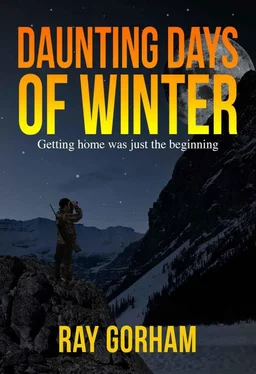Ray Gorham - Daunting Days of Winter
Здесь есть возможность читать онлайн «Ray Gorham - Daunting Days of Winter» весь текст электронной книги совершенно бесплатно (целиком полную версию без сокращений). В некоторых случаях можно слушать аудио, скачать через торрент в формате fb2 и присутствует краткое содержание. Жанр: Фэнтези, на английском языке. Описание произведения, (предисловие) а так же отзывы посетителей доступны на портале библиотеки ЛибКат.
- Название:Daunting Days of Winter
- Автор:
- Жанр:
- Год:неизвестен
- ISBN:нет данных
- Рейтинг книги:3 / 5. Голосов: 1
-
Избранное:Добавить в избранное
- Отзывы:
-
Ваша оценка:
- 60
- 1
- 2
- 3
- 4
- 5
Daunting Days of Winter: краткое содержание, описание и аннотация
Предлагаем к чтению аннотацию, описание, краткое содержание или предисловие (зависит от того, что написал сам автор книги «Daunting Days of Winter»). Если вы не нашли необходимую информацию о книге — напишите в комментариях, мы постараемся отыскать её.
Daunting Days of Winter — читать онлайн бесплатно полную книгу (весь текст) целиком
Ниже представлен текст книги, разбитый по страницам. Система сохранения места последней прочитанной страницы, позволяет с удобством читать онлайн бесплатно книгу «Daunting Days of Winter», без необходимости каждый раз заново искать на чём Вы остановились. Поставьте закладку, и сможете в любой момент перейти на страницу, на которой закончили чтение.
Интервал:
Закладка:
Ray Gorham, Jodi Gorham
Daunting Days of Winter
PROLOGUE
Daunting Days of Winter picks up the story where 77 Days in September , originally released in May of 2011, leaves off. 77 Days in September is the story of Kyle and Jennifer Tait, an ordinary couple surviving extraordinary circumstances.
Kyle, a supervisor with an electrical power company, has been in Houston helping with recovery after a major hurricane. As he prepares to fly home to Montana, terrorists launch a massive EMP strike against the continental United States, successfully destroying the electrical and computer infrastructure of the nation. Kyle’s plane crashes upon take-off, and he barely escapes the burning wreckage, only to find himself stranded in a country where technology has been wiped out and modern-day people are left struggling to survive in a primitive world.
Forced to devise a plan to get himself home, and with the help of a fellow airplane survivor, Kyle builds a handcart to haul the meager supplies he needs to attempt the 2,000-mile journey from Texas to Montana on foot.
Across the country, Jennifer and their children, David, Emma and Spencer, face unimaginable challenges of their own. With no power, communication, or modern conveniences, life in rural Montana is not as carefree as the family is used to. Grocery stores are looted, doctors are unavailable, and law enforcement is unreliable, if not nonexistent. The residents of the Tait’s small community band together to deal with the new reality in which they live, forming councils and structure, but quickly realizing that life will be far more difficult than any of them care to imagine.
While Jennifer toils to protect and provide for their family, Kyle and his handcart slowly move northward. He encounters stranded motorists, hostile gangs, highway bandits, and extreme weather conditions that threaten his safety and his very life. But he also finds evidence that, despite the dire circumstances, goodness and mercy still exist. In neighboring Wyoming, Kyle is saved from certain death by Rose Duncan, an attractive and independent woman isolated from her family and with whom Kyle quickly bonds, testing his resolve and his dedication to his family to the extreme.
With Kyle completing the last leg of his journey home, Jennifer’s trials escalate and her family’s safety is threatened after she repeatedly rebuffs the unwanted advances of Doug, the local law enforcement officer whose sanity and stability are slipping away. At Doug’s mercy, Jennifer faces violence and assault during a series of events that culminate in the death of Doug and the potentially fatal stabbing of the Tait’s son, David, leaving Kyle to return to an empty, blood-stained home before finally reuniting with his family.
Daunting Days of Winter begins the day of Kyle’s miraculous reunion with his family and takes you further into the experience of post-EMP America. Enjoy the adventure.
1859
The impact of an EMP on the modern world would change life beyond imagination for the average “civilized” person. It would take us back to a time before electricity, computer chips, and satellite communication. It would take us back to a year like 1859.
In the century and a half since 1859, the world has seen change on a scale inconceivable to any previous generation of people. We’ve progressed from man, wind, and animal powered forms of transportation, to cars, airplanes, nuclear submarines, and space shuttles. Health and medicine have progressed from bleedings and wooden teeth to heart transplants, genetic engineering, and brain surgery. The availability of knowledge has transitioned from elementary primers that remained current for decades, to computer tablets that store thousands of books, update daily, and show live video feeds from around the world.
And yet, the citizens of 1859 saw change as well. Trains began to challenge steamboats for commercial superiority, electrification was being developed (though the first public generating station wouldn’t be built until 1881), dental hygiene improved with the patent of the toothbrush in 1857, and medical and scientific breakthroughs were occurring at a breakneck pace around the globe.
For the average citizen, however, everyday life wasn’t much different from what it had been when Columbus crossed the oceans or King Arthur’s knights roamed the countryside. Life expectancy was just over forty years for a newborn child, three in ten children died before the age of fifteen, and a woman who bore eight children (a common family size for those times due to the manpower needed for the family farm and ineffective birth control) stood a better than ten percent chance of dying during childbirth. Two-thirds of all men worked as farmers, clearing the land, sowing by hand, and herding the animals, as well as helping to provide the local defense. These farmers were supported by a spouse who, in addition to helping in the fields, spent a large portion of her day cooking, sewing, teaching, mending, washing, hauling water, doctoring children and animals, gardening, and taking the wagon to the general store.
Compared to today, life was difficult and challenging in a host of ways. The Oregon Trail was the transcontinental highway of the time, having been used, at that point, by nearly 400,000 brave pioneers who walked or rode in a wagon across the continent, many who would end up buried in unmarked graves along the way. That same trail would continue to be used for another decade by immigrants heading for Oregon, California, Utah, and other places in the West, until the first transcontinental railway was completed in 1869.
Bank robbers and highway bandits plied their trade during these years with relative immunity, escaping afterwards into the unmapped and uninhabited countryside or to towns where word of their deeds hadn’t reached. On those occasions when the law did catch up with these outlaws, justice was swift and harsh, and often at the end of a hangman’s noose.
Diets were bland and variety was limited. Farm animals provided the protein, supplemented mainly by whatever could be grown locally, usually corn, potatoes, apples, grains, and a few other staples. Soups and breads were regularly served in most households, while ice cream, chocolate, potato chips, and Coca Cola either hadn’t been created yet or were such luxuries that the average person had never experienced them.
Clothing was typically handmade and passed down from one child to the next, and furs were often worn out of practicality, not as a fashion statement.
Mail delivery was slow, unreliable, and inefficient, making long distance communication difficult. The Pony Express, offering Missouri to California delivery in the unbelievable time span of just ten days and achieved by way of 120 riders using 400 horses and covering 1,900 miles, wouldn’t begin its eighteen months of operation until the next year, in April of 1860.
Politically, James Buchannan was president, Oregon was admitted into the Union, and a fifty-year old lawyer named Abraham Lincoln was building his reputation as a presidential candidate. An English naturalist named Charles Darwin, who few in America had heard of, published a book proposing a radical theory on the origin of species. And John Brown, a militant reformer, tossed a proverbial match into the gas can of slavery by way of a failed uprising at Harper’s Ferry, Virginia, paying with his life just six weeks later at the conclusion of a short trial.
One other event from 1859 also deserves mention. On September 1 stof that year, Robert Carrington, while watching the sky from his private observatory in London, observed a flare on the sun of such unusual brightness and intensity that he diagramed and made note of the event. For the next two days after the flare, the world was awash in unusual phenomena. Northern Lights, observed as far south as Jamaica, were so bright in parts of America that tradesmen, lacking watches and alarm clocks, went to work thinking it was morning, and people across the Northern Hemisphere believed neighboring towns to be on fire. Even birds were fooled into thinking that it was daytime and began singing during the night.
Читать дальшеИнтервал:
Закладка:
Похожие книги на «Daunting Days of Winter»
Представляем Вашему вниманию похожие книги на «Daunting Days of Winter» списком для выбора. Мы отобрали схожую по названию и смыслу литературу в надежде предоставить читателям больше вариантов отыскать новые, интересные, ещё непрочитанные произведения.
Обсуждение, отзывы о книге «Daunting Days of Winter» и просто собственные мнения читателей. Оставьте ваши комментарии, напишите, что Вы думаете о произведении, его смысле или главных героях. Укажите что конкретно понравилось, а что нет, и почему Вы так считаете.












